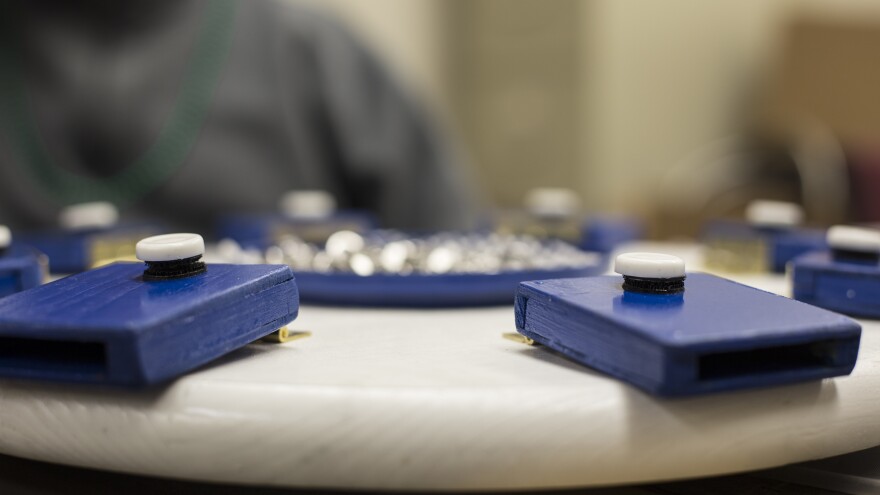Working with the device, Noll has been able to increase his productivity by nearly 100 percent.
Robert Noll’s job is pretty simple. As a contractor for MARC Industries in Manchester, Noll screws nuts onto U-bolts that are used to install pipes and sprinkler systems.
But he's visually and intellectually disabled, so performing this task efficiently is sometimes a problem.
Sometimes Noll would screw the nuts on too far, or not far enough, or not at all. So five East Catholic High School students decided to help, including junior John Diloreto.
"We were just kind of thinking, man, wouldn’t it be really great if we could just help Noll out a little bit -- maybe do with a little less help from the staff," Diloreto said. "So we thought: Well, let’s see how can we do that, how can he execute this, and how can we get a good design."

They created a rotating disk that holds the U-bolts in place. This way, Noll's hands are free to twist the nut until it hits the cartridge that holds the bolt. Now the nuts are at the perfect position, and he’s been able to increase his output by nearly 100 percent.
The device, called a RUD, which stands for “Noll's U-bolt Device,” won fourth place in the SourceAmerica Design Challenge, which is an engineering competition to design workplace technology for people with disabilities.
The device was painted blue and white, colors that can help orient people who are visually impaired. They're also East Catholic's school colors.
The students' advisor, Sue Fennelly, said it’s the best contest of its kind.
“It takes the students through the entire design process, from finding a problem, to figuring out how to solve it, to making something, and then ultimately testing and marketing the product,” said Fennelly, who has coached winning teams from Wethersfield in the past.
After being selected as finalists, they went to Washington, D.C. where they and other high school students displayed their inventions. Junior Emma Dolen says the experience was pretty intense.
“You could look over and see Noll in the audience and he was just smiling at us, and it was like, just the coolest moment. It was finally the climax of our trip and we were presenting our thing, so it was like, adrenaline rush,” Emma said.


Jon Sargent, one of the team's coaches, noted that East Catholic made their device on their own time, when other schools were required to invent something as part of an engineering class.
"They had to fit [it] in between track practice and band practice, and school and prom, and everything, and they just came through in the clutch," Sargent said. "The fact they went this far on their first time, is just amazing. We can't be more proud of the job they did on it."
The students also toured Capitol Hill and meet with Congressman Joe Courtney. Senior Alex Fernez said the competition took up more time than building the device.
"I thought it was nice that we were able to help [Noll] significantly, and just the realization that we could do that in the future for other people with other needs, I thought was nice," Fernez said.

Whatever the students did, it worked for the judges. Their attention to detail probably helped. The device was painted East Catholic’s school colors – blue and white – which are colors that can help orient people who are visually impaired. They also included mesh under the nut reservoir.
The project was a win for everyone, said senior Garrett Carlson.
“We as students were able to get some great engineering experience, Noll could increase his efficiency and therefore actually get more money in his pocket, and MARC was able to output more u-bolts," Garrett said. "So everyone in this situation benefited, so it was really great.”
The judges gave the students some advice on how to improve the RUD, but Noll seems to enjoy it just fine.
“I like it just the way it is,” Noll said.
Funding Threatened
Kevin Zingler, MARC’s marketing director, said he hopes to continue working with East Catholic High School in the future.
"A lot of folks here, staff-wise, are thinking about projects," Zingler said, "and thinking about things we need help with and how we can help another person like we helped Robert, and how we can enhance the quality of life for people with disabilities, which is our main mission."
But the kind of help MARC provides is in jeopardy. Governor Dannel Malloy has proposed significant cuts to the Department of Developmental Services, which funds a portion of MARC’s budget.
Zingler said that he hopes that the legislature will consider not only what MARC provides for the disabled, but also how it benefits other programs, like the students at East Catholic.
"The system’s not broke, look at Robert," Zingler said. "Look at what he can do. Look at how happy he is. Look at how his family is – his father was so excited that he was in Washington, his parents actually flew down and joined us at the competition. And they said, 'This is the first time that someone has ever acknowledged my son’s abilities.' How do you take that away from someone? You can’t."






